May 29, 2024
The random HIPAA audits are officially back. Melanie Fontes Rainer, Director of the Office for Civil Rights (OCR), confirmed in a recent interview that the OCR is proactively conducting audits as part of a series of improvements.
Following a five-year hiatus from proactive audits, the Office for Civil Rights (OCR) has been updating key HIPAA regulations. For instance, the OCR is also releasing an updated Security Rule by the end of the year to better reflect innovation since its original publication over twenty years ago.
As the OCR continues to advance HIPAA rules, it’s vital to be prepared with a foundation of a compliant practice.
At the base of this foundation is the Security Risk Analysis (SRA), a commonly missing HIPAA requirement. During the last round of proactive audits, 86% of Covered Entities could not show a properly documented SRA for their practice.
What is a Security Risk Analysis (SRA)?
The OCR defines an SRA as “an accurate and thorough assessment of potential risks and vulnerabilities to confidentiality, integrity, and availability of electronic Protected Health Information (ePHI).”
The SRA is focused on protecting ePHI. It is a continuous requirement and needs to be updated when significant changes occur to your practice. It’s best practice to complete the SRA at least annually.
An SRA is a complete evaluation of how PHI is protected. Questions include encryption practices, staff training, disposal of PHI, and more.
Why is the SRA Important?
The SRA documents proof that a practice has appropriate safeguards to protect sensitive patient data. It requires practices to conduct self-audits and identify risks and vulnerabilities before they become issues. This means anticipating vulnerabilities and implementing preventative measures before sensitive data is compromised.
If followed correctly, the SRA acts as a vital line of defense, helping prevent data breaches, ensuring patient privacy, and building trust within the healthcare system.
How do I complete an SRA?
Completing an SRA is crucial for protecting sensitive patient data. The good news is that several approaches are available, each with varying costs and timelines.
Before starting an SRA, it is essential to have an HCO, or HIPAA Compliance Officer, in place to manage HIPAA documentation and the SRA process.
You can complete the SRA internally using online resources provided by the OCR. While there are free resources, this option is less intuitive than others, can be time-intensive, and requires significant team effort. Manual audits can take weeks to months to complete.
You could also hire an external auditor or consultant to complete your SRA. Hiring a consultant might reduce the burden on your team but can be costly. The average price of an external auditor is in the thousands, with some costing upwards of $20,000. Additionally, these external audits can take months.
An alternative option is intelligent compliance software, which provides significant benefits for meeting the SRA requirement and more. It allows you and your practice to navigate the SRA cost-effectively and efficiently. While a manual audit usually takes weeks to months, an audit assisted by software can be completed in significantly less time, simplifying the SRA process, and saving your practice substantial costs and assuring protection.
Why Should I Use Compliance Software?
As the Security Rule is updated, your compliance program also deserves an upgrade.
Intelligent software solutions can help you easily fulfill complex HIPAA requirements, prepare for potential risks and vulnerabilities, and protect patient data. Many organizations overlook the SRA, but software solutions can streamline the process and protect your practice.
To learn more about Abyde’s innovative software solutions, schedule an educational consultation.





